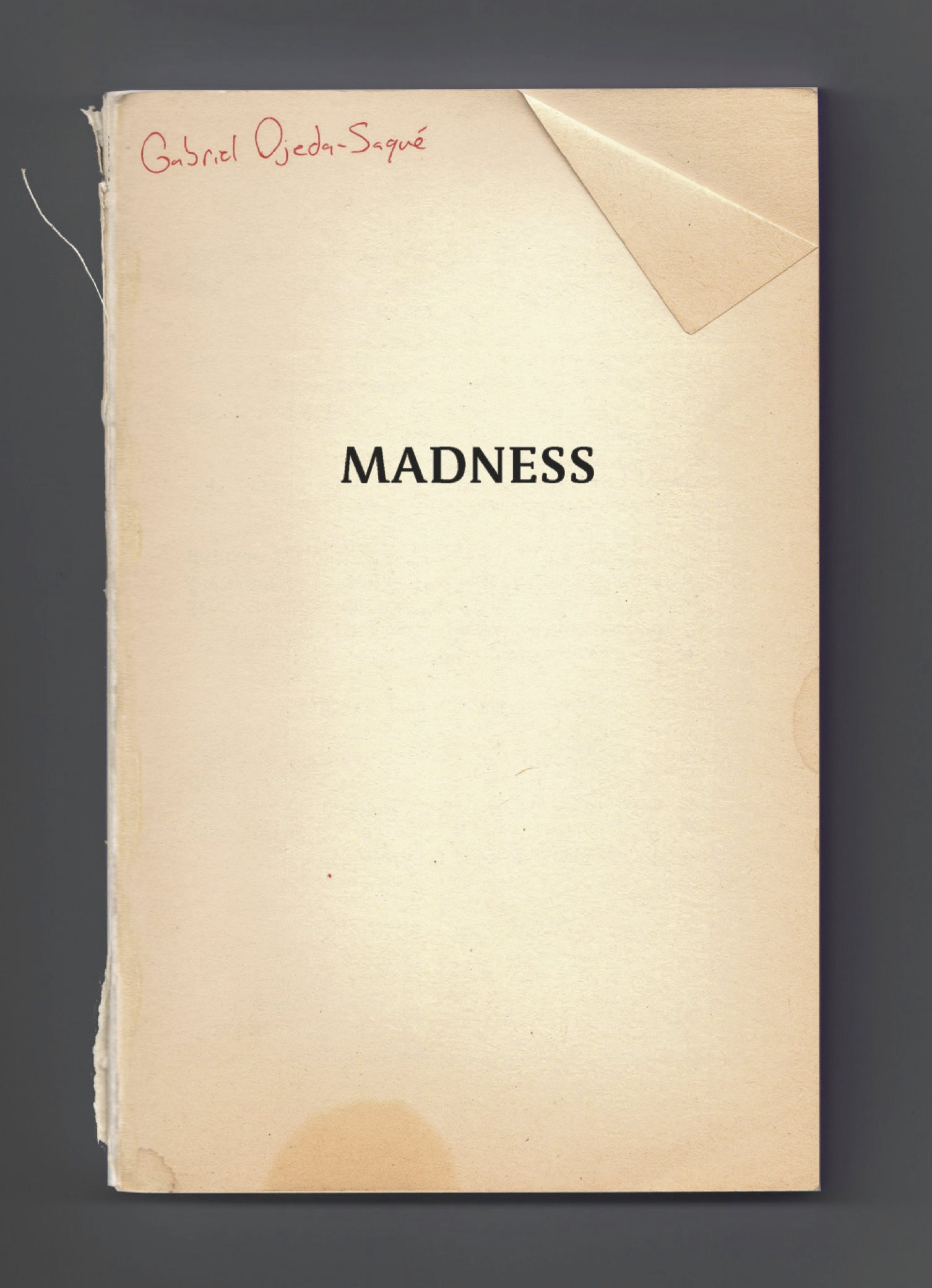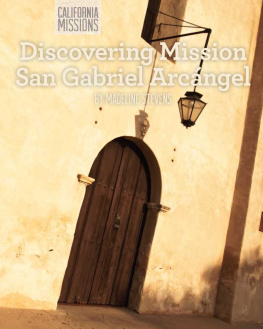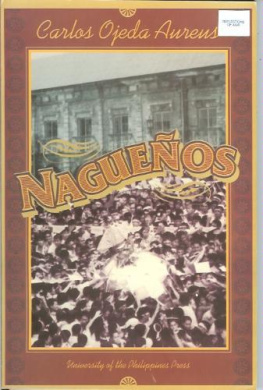Gabriel Ojeda-Sague - Madness
Here you can read online Gabriel Ojeda-Sague - Madness full text of the book (entire story) in english for free. Download pdf and epub, get meaning, cover and reviews about this ebook. year: 2022, publisher: Nightboat Books, genre: Art. Description of the work, (preface) as well as reviews are available. Best literature library LitArk.com created for fans of good reading and offers a wide selection of genres:
Romance novel
Science fiction
Adventure
Detective
Science
History
Home and family
Prose
Art
Politics
Computer
Non-fiction
Religion
Business
Children
Humor
Choose a favorite category and find really read worthwhile books. Enjoy immersion in the world of imagination, feel the emotions of the characters or learn something new for yourself, make an fascinating discovery.

- Book:Madness
- Author:
- Publisher:Nightboat Books
- Genre:
- Year:2022
- Rating:3 / 5
- Favourites:Add to favourites
- Your mark:
- 60
- 1
- 2
- 3
- 4
- 5
Madness: summary, description and annotation
We offer to read an annotation, description, summary or preface (depends on what the author of the book "Madness" wrote himself). If you haven't found the necessary information about the book — write in the comments, we will try to find it.
Madness — read online for free the complete book (whole text) full work
Below is the text of the book, divided by pages. System saving the place of the last page read, allows you to conveniently read the book "Madness" online for free, without having to search again every time where you left off. Put a bookmark, and you can go to the page where you finished reading at any time.
Font size:
Interval:
Bookmark:

KELLY WASHBOURNE Mosquitoes in flight Tiny wings batting the air Eggs into egg cream KEVIN KILLIAN, MOSQUITOES for Jibreel Everything past this page is a fiction. All real parties and persons mentioned past this page did not act in the way they are described here. The reader will be informed when they can assume truth again. MADNESS THE SELECTED POEMS OF LUIS MONTES-TORRES (1976-2035) Edited by Javier de las Palmas & ngel de la Escoba NIGHTBOAT BOOKS New York
He was a boring fire. This is the first selection of his poems, published twenty years after his death in 2035. It was a question about immigrant environmentalisms, posed to us by a mentor and comrade of ours, that led us back to Montes-Torress poetry: do they work? Do they work? To ngel, this meant do they effect change in the world, do they reverberate? To Javier, this meant do they coalesce together, do they jell into anything like a philosophy? A prior research collaboration of ours on multilingual protest poetics brought Montes-Torres into our footnotes as a negative, one example among many of Cuban American poets writing exclusively in English. But we remembered later, on brainstorming how to wrap our heads around this question, the uneven breadth of Montes-Torress work, the gestures and confusions he seemed to set out for us, towards these issues and more. We knew that his work seemed to know something, something useful, though it was unclear what exactly. And so began our long, new relationship to a minor poet, one who briefly reached notoriety on being shortlisted for the National Book Award and on winning the Lambda Literary Award for his collection The Ocean as It Shouldnt Be, but who went almost entirely disregarded by the end of his life.
As we moved through what we could find of his work, we noticed a pattern. Each piece of Montes-Torress career that we encountered seemed disconnected from the others, each book uncomfortable with its place in his body of work, each critic of his only able to hold one book or one poem or one theme to analysis at a time. Our job, as we began to see it, was to be connective tissue. We decided, perhaps out of frustration, perhaps out of faith that there was indeed something there, to take on the task of organizing what we could find, of making for Montes-Torres a document that would turn this scatter into a line. This book is the result. With a grant from the National Association of Latino Arts and Cultures and with the guidance of Montes-Torress longtime partner, Evan Bower, we have been able to edit this selection of Montes-Torress poetry.
This book is arranged chronologically, selecting various poems from each of Montes-Torress published books, presented in the order they originally appeared in. As well, among his poems, we have tried to build something of a biography for this still under-known poet. In brief notes before each selection of poems, we detail the events of his life that led to the publication of each book, his interlocutors at the time, and some frameworks for thinking about the contributions and consequences of his life for Latino-American poetics in the early 21st century. His moves, his attachments, his fears, his moodsas much as these seem to thicken the meaning and context of his poetry, just as often these bits of his life deflate, confuse, or betray it. He was both frustratingly mild and dramatically reactive. He was a man of obsessions and anxiety, of interest and wonder.
He was as much enchanted as disenchanted. We wanted to be stuck with Montes-Torres, stuck in the same way he was stuck, and we invite the reader to follow us there. Javier de las Palmas & ngel de la Escoba, 2055
He attended English-language schools where his grades were poor and he had few friends, both due in large part to his initial difficulty with English. Even without much of a social circle through his education and adolescence, Montes-Torres was generally described by his family as a charming, energetic, and positive child. He collected insects, taught himself crochet, and watched movies to pass the time; he was boyish and handsome, though acne-prone and susceptible to chronic ear infections. After graduating from high school, he attended George Washington University for a single semester before dropping out in 1994. In a 2012 interview in BOMB, he cited a boredom [he] could not find the bottom of as the reason for his leaving the university so quickly. A generally poor relationship with his father, the fact that he had not had contact with his mother since 1980, and his lack of close friends left Montes-Torres with very little financial support during his first years out of college.
During that time, he worked for meager pay as a food prep assistant at a gallery in Washington, DC, where he became exposed to art and writing outside of school. In the same interview from 2012, Montes-Torres says of this time: There was so much I had to do to feel I had my feet on the ground anywhere in the world. I began a process of internal digging, hoping I would find an inner resource to replace the joy of outside things, which had started to dull. But I didnt find anything inside of me. Art in my life was a temporary answer to an important question: what do I now care for? Montes-Torres credits his first encounter with poetry as an adult to reading John Wienerss
Font size:
Interval:
Bookmark:
Similar books «Madness»
Look at similar books to Madness. We have selected literature similar in name and meaning in the hope of providing readers with more options to find new, interesting, not yet read works.
Discussion, reviews of the book Madness and just readers' own opinions. Leave your comments, write what you think about the work, its meaning or the main characters. Specify what exactly you liked and what you didn't like, and why you think so.











